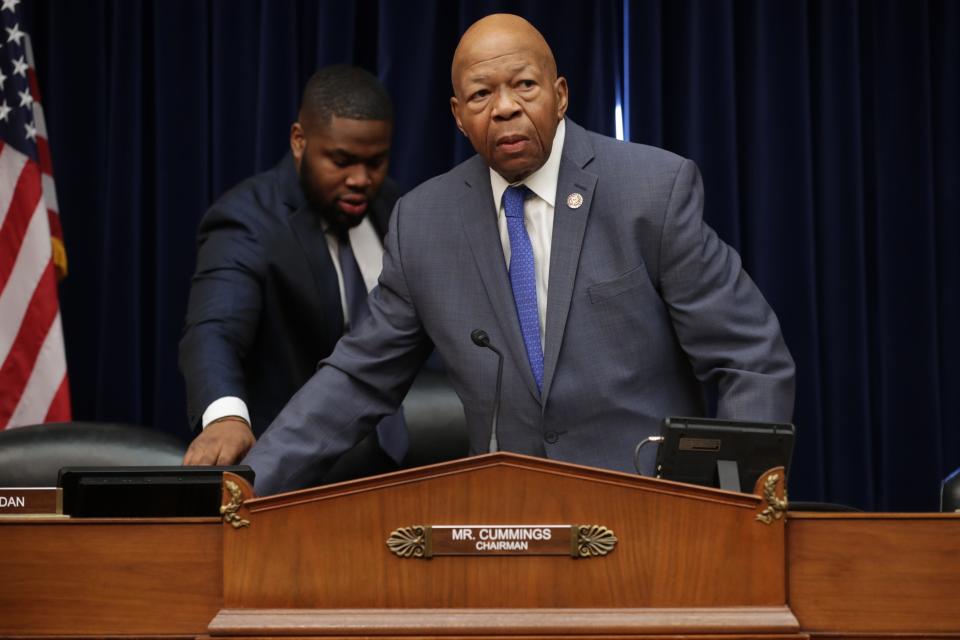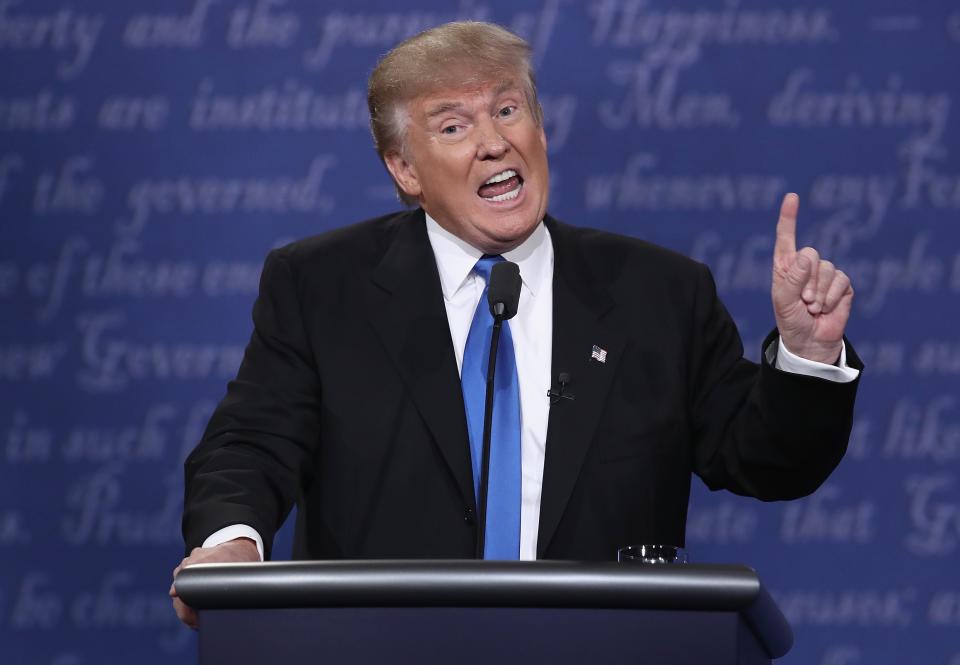Trump faces uphill battle to keep financial records from Congress after lawyers clash in appeals court

WASHINGTON — President Donald Trump appeared to be facing an uphill battle to keep Congress from his obtaining his financial records after his lawyer faced more than an hour of skeptical questioning Friday over his arguments that lawmakers don't have the power to investigate the president.
At least two of the three judges on the federal appeals court panel hearing Trump's challenge appeared unpersuaded by the president's arguments that Congress' oversight powers don't give it the authority to examine presidential corruption.
"I think I heard you say that when it comes to the president ... Congress can't ask questions," Judge Patricia Millett asked Trump's lawyer, William Consovoy. "Your theory here is that he's absolutely immune from any oversight. Is that right?"
Related Video: Trump Drops Citizenship Question From Census
As Consovoy began to answer, Millet interrupted: "Is that right?"
Consovoy said Congress' legislative powers don't give it the authority to examine presidential wrongdoing.
The hearing in the U.S. Court of Appeals for the D.C. Circuit was part of Trump's challenge to subpoena by the House Oversight Committee seeking copies of his financial records. The committee demanded that the firm, Mazars USA, provide years worth of records, including meeting notes and communications.
The case is one of several legal fights between Trump and Democratic lawmakers that could redefine the powers of the two branches of government. Trump's attorneys have argued that by seeking his financial records, Congress is attempting to exercise law enforcement powers that belong to the executive branch. The White House has raised similar arguments in an effort to deflect other congressional subpoenas.
U.S. District Judge Amit Mehta ruled in May that Trump cannot block the House Oversight and Reform Committee's subpoena for records prepared by the president's accountant. The judge said that Congress' legislative and investigatory powers afford it the right to see Trump's financial documents and that the committee, chaired by Rep. Elijah Cummings, has outlined "facially valid legislative purposes" for why it needs to investigate the president.

The committee is seeking financial statements related to Trump and his businesses dating as far back as 2011, years before he announced his candidacy for president. Cummings, D-Md., said in a memo in April that lawmakers need the records to investigate whether Trump engaged in illegal conduct before or after he became president, whether he has undisclosed conflicts of interest, whether he correctly reported his finances on government disclosure forms and whether he complied with the emoluments clause, which prohibits a president from receiving payments from foreign governments.
Trump's lawyers promptly sued to keep Congress from obtaining the records and accused House Democrats of declaring an "all-out political war" against the president, with subpoenas as "their weapon of choice." They said that the Democratic-controlled committee is using its investigative authority for political reasons and that obtaining Trump's financial records serve no legislative purpose.
The Oversight committee's attorneys argued that it has broad and inherent power to investigate and that an inquiry into possible conflicts of interest by the president will help strengthen ethics and disclosure laws. Mehta agreed.
"Congress plainly views itself as having sweeping authority to investigate illegal conduct of a president, before and after taking office," Mehta wrote in May. "This court is not prepared to roll back the tide of history."
Trump's attorneys are now appealing Mehta's ruling.
During a hearing that lasted more than two hours Friday, Consovoy said House rules don't allow the Oversight committee to subpoena the president's personal financial records and that the committee's authority "should be read narrowly."
The three judges hearing the case questioned Consovoy about why investigating the president won't lead to legitimate legislation. Judge David Tatel cited two pieces of legislation that have already been passed in the House. One would would require presidents and vice presidents to release their tax returns, though the bill was doomed to fail in the Senate.
"Are we supposed to say that's all a ruse?" Tatel asked.
More: 'We're fighting all the subpoenas.' Congress and Trump prepare to battle over wide-ranging probes
Cummings issued the subpoena for Trump's financial records a few months after the president's former personal attorney, Michael Cohen, told the committee that Trump routinely misrepresented the size of his fortune to suit his purposes. Cohen said Trump inflated his assets to obtain loans and deflated them to reduce his real estate taxes. Cohen is now serving a three-year prison sentence after pleading guilty to lying to Congress and several financial crimes.
The House committee's attorney, Douglas Letter also faced tough questioning for an hour, mostly from Judge Neomi Rao. She asked Letter to cite another instance in history when a committee investigated the president using a subpoena without a full vote in the House and Senate.
"If you can't cite an example, doesn't that raise constitutional questions on whether it's permissible?" Rao asked Letter, who said that Trump, unlike other presidents, did not fully separate from his business or disclose his financial records. But Rao seemed skeptical that Congress has the authority to use a "compulsory process" — in this case, a subpoena — against the president.
Consovoy wrapped up by saying that the main question the judges face is whether seeking Trump's records is about finding wrongdoing, which he argued would be improper, or coming up with legislation. "I don't think it's a hard question," Consovoy said.
The lawsuit is the latest salvo in a series of investigations that are continuing into Trump and his businesses in the aftermath of special counsel Robert Mueller's investigation into Russian interference in the 2016 presidential election. That probe ended without a finding that Trump had committed a crime, but federal prosecutors and congressional committees are conducting a variety of separate investigations into the president and his businesses.
The U.S. Fourth Circuit of Appeals on Wednesday tossed a separate lawsuit that accused Trump of violating the Constitution's emoluments clause by continuing to make money from his businesses while in office. The suit points to profits from domestic and foreign governments that patronize Trump's businesses, including the Trump International Hotel. The three-judge panel did not rule on whether Trump had violated the Constitution, but said that neither Maryland nor the District of Columbia had been sufficiently harmed to bring the case to court.

More:
President Trump and his businesses ask a court to block Congress from obtaining accounting records
This article originally appeared on USA TODAY: Trump faces uphill fight over financial records in appeals court

